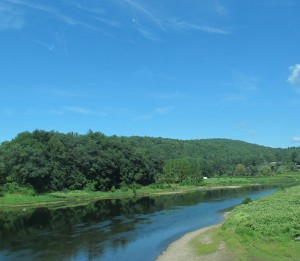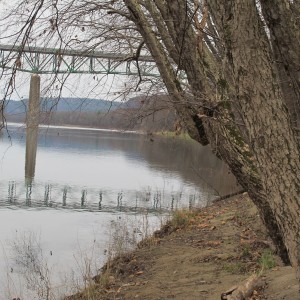Law Would Offer New Federal Protection for Delaware River Basin

Katie Colaneri/StateImpact Pennsylvania
A view of the Delaware River where it separates Northeast Pennsylvania on the right with New York State on the left.
Federal lawmakers on Tuesday stepped up efforts to conserve the Delaware River Basin when they reintroduced a bill that would enhance federal protection for the 300-mile watershed between upstate New York and the mouth of the Delaware Bay.
The Delaware River Basin Conservation Act would charge the U.S. Fish & Wildlife Service with coordinating the activities of an array of federal, state and local environmental groups, and would provide $5 million in grant funding to support conservation projects.
The Fish and Wildlife Service would identify and implement conservation activities without setting new regulations, while the funding would require a 50 percent non-federal match, meaning that the governmental support would be doubled.
Existing watershed organizations include the Delaware River Basin Commission, an interstate agency that oversees water quality and usage, and which has welcomed the legislation as a way of defending environmental quality in ways that are outside of its operations.
The DRBC, which represents the basin states of Pennsylvania, New Jersey, New York and Delaware, as well as the federal government, has operated without its designated federal funding for most of the last 20 years, and has experienced several reductions in state funding.
The Commission has complained that the funding shortage has restricted its ability to plan for major impacts to water supply, such as the floods and droughts that are expected to come with climate change. The basin supplies drinking water to some 15 million people in four states.
On Tuesday, the Commission reiterated its support for the bill. Spokesman Clarke Rupert said it “would not duplicate or conflict with the DRBC’s responsibilities. Instead, it would enhance collaboration of conservation efforts underway in the basin and build on those efforts.”
Former DRBC executive director Carol Collier said the commission’s current responsibilities would fit in with the broader vision of the bill. “They are focusing on things that are not on the dashboard of the DRBC. It’s things that are very helpful to the basin but things that regulatory agencies aren’t very good at,” she said.
A combination of federal coordination and extra funding would allow the launch of conservation projects that may not otherwise get done, said Kim Beidler, project coordinator for the Coalition for the Delaware River Watershed, an advocacy group supported in part by the William Penn Foundation, which funds its education and outreach initiatives.
The bill, sponsored by Rep. John Carney and Sen. Tom Carper, both of Delaware, would allow participating groups to complement existing efforts that may be restricted by the specific requirements of grant funding, Beidler said.
It would encourage a range of projects that could be undertaken by entities such as state and local governments, nonprofits, and universities, and would eliminate any duplication of effort. “It allows for a much more comprehensive approach,” she said.
Environmental groups also include the Partnership for the Delaware Estuary, which monitors ecosystem services, such as coastal protection by wetlands, in the tidal portion of the river as far north as Trenton, NJ, as part of the Congressionally mandated National Estuary Program.
PDE Science Director Danielle Kreeger said it makes sense to have a federal coordinating body such as the Fish & Wildlife Service to oversee conservation in the basin because many of its issues transcend the jurisdictions of existing entities like state environment agencies.
“The federal government working with these watershed-based organizations is really the smartest way to address the priorities at the system level,” she said. “You really want a watershed-based approach.”
While PDE strongly supports the bill, the financial support that would flow from it is a “drop in the bucket” compared both with federal funding for other major watersheds like the Chesapeake or the Long Island Sound, and with PDE’s own estimate of $100 million that would be needed to sustain ecosystem services in the estuary in future, Kreeger said.
A ceremony on Capitol Hill marked the bill’s fourth introduction since being launched by former Delaware Congressman Mike Castle in 2010. It previously failed to gather sufficient bipartisan support to become law but has now attracted more backers from both sides of the aisle, supporters say.
Backers of the latest version of the bill https://www.congress.gov/bill/113th-congress/house-bill/644 include Pennsylvania Republican Rep. Charles Dent, and Pennsylvania Democrat Brendan Boyle.
Rep. Boyle said the bill will empower local organizations to restore the basin.
“Since the Delaware watershed is one of the few large rivers in the country that has no dedicated source of federal funding, the $5 million matching-grant program in this bill will be a good start to ensure that the basin is protected for generations to come,” he said, in a statement.
Asked whether the bill has a better chance of becoming law than its previous versions, Boyle said it has bipartisan support but “may be held up by Republican leadership in Congress” because of the funding it contains.
Rep. Dent said support for the bill has increased compared with its earlier versions.
“More of our colleagues are beginning to realize that this is something we should be doing and also something that we can afford to be doing,” he said.
The bill had 22 cosponsors as of Tuesday afternoon, according to Beidler.
*The William Penn Foundation also provides funds to StateImpact Pennsylvania. A clarification has been added to the original story regarding the William Penn Foundations support of the Coalition for the Delaware River Watershed. The Foundation funds only the educational and outreach aspects of the organization.

















